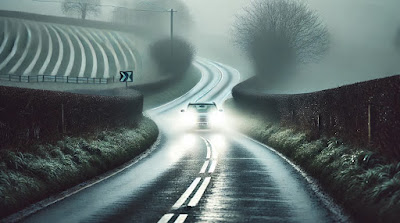Driving through the winding country roads of the Cotswolds at night should be a pleasure, but lately, it's felt more like a game of Russian roulette. The culprit? Not the usual suspects of potholes or dawdling tourists, but a more insidious menace: road salt, damp weather, and the vanishing act performed by white lines on our roads. Add to that the blinding glare of modern headlights and a touch of fog, and you've got a recipe for disaster that even the most seasoned driver struggles to navigate.

Let's start with the salt - that gritty saviour of winter roads, keeping us from careening into hedgerows when Jack Frost makes his rounds. It does its job, no doubt, but once the salt lorries have passed and the skies decide to sprinkle us with drizzle instead of a proper downpour, we're left with a greasy residue that turns road markings into a ghostly blur at night. Those once-crisp white lines become nothing more than faint smudges. And in the murk of a British January, faint smudges are as useful as a chocolate teapot when you're trying to stay on the right side of the road.
One might argue that this is just a minor inconvenience. But it isn't. Not when you're navigating country roads where verges and ditches wait to swallow your tyres and especially not when you're faced with oncoming traffic armed with modern LED headlights that seem designed to burn through your retinas.
I've written about modern headlights before - once upon a time, a car's beams lit the road ahead in a civilised manner, allowing drivers to see without turning the experience into a light show worthy of a Pink Floyd concert. But no more. Today's headlights are brighter, harsher, and more disorienting than ever before. It's as though manufacturers have decided that blinding every other driver is a perfectly acceptable price to pay for slightly better visibility for the person behind the wheel. Never mind that those blinding beams make it impossible to discern road markings that have already been rendered all but invisible by our friend, the salted sludge.
The combination is treacherous. You're driving along, squinting through a windscreen coated in road spray, desperately trying to make out the faint shimmer of a white line that may or may not still exist. Then, bam - an SUV comes hurtling towards you, lights blazing with the intensity of a thousand suns. Your instinct is to veer slightly to the left to avoid being blinded, but without a clear road marking to guide you, who knows where you'll end up? The hedge? The ditch? The afterlife?
And it's not just a matter of inconvenience. This is a genuine safety issue. White lines are there for a reason: to provide guidance, to keep us on track, and to prevent accidents. When those lines become indistinguishable from the surrounding road, particularly at night or in wet conditions, they fail in their fundamental purpose. Couple that with modern headlights that transform every oncoming vehicle into a mobile lighthouse, and you've got a perfect storm of reduced visibility and increased danger.
These photos are taken in daylight and on a country road that has white lines. I'd previously navigated the roads when it was dark:
You can't even make them out in daylight, let alone the dark.
What can be done? We could rethink the materials and methods used for road markings. It's clear that whatever is currently in use isn't cutting the mustard in wet and salted conditions. Perhaps a more durable, reflective paint is in order - one that doesn't succumb to grime quite so easily - but that's unlikely given the state of finances. And while we're at it, maybe it's time for the powers that be to consider regulating the intensity of car headlights. Surely there's a middle ground between illuminating the road and torching the retinas of everyone in your path?
Until then, drivers on country roads will continue to navigate a perilous landscape of blurred lines and blinding lights, hoping that the next bend doesn't bring an unwelcome surprise. It's a situation that should demand attention - not tomorrow, not next year, but now - but won't for obvious reasons. However, let's face it: no one should feel like they're driving into the abyss every time they head out after a bit of drizzle and a visit from the salt lorry. What we really need is a good downpour to wash away the grime from the roads.





No comments:
Post a Comment